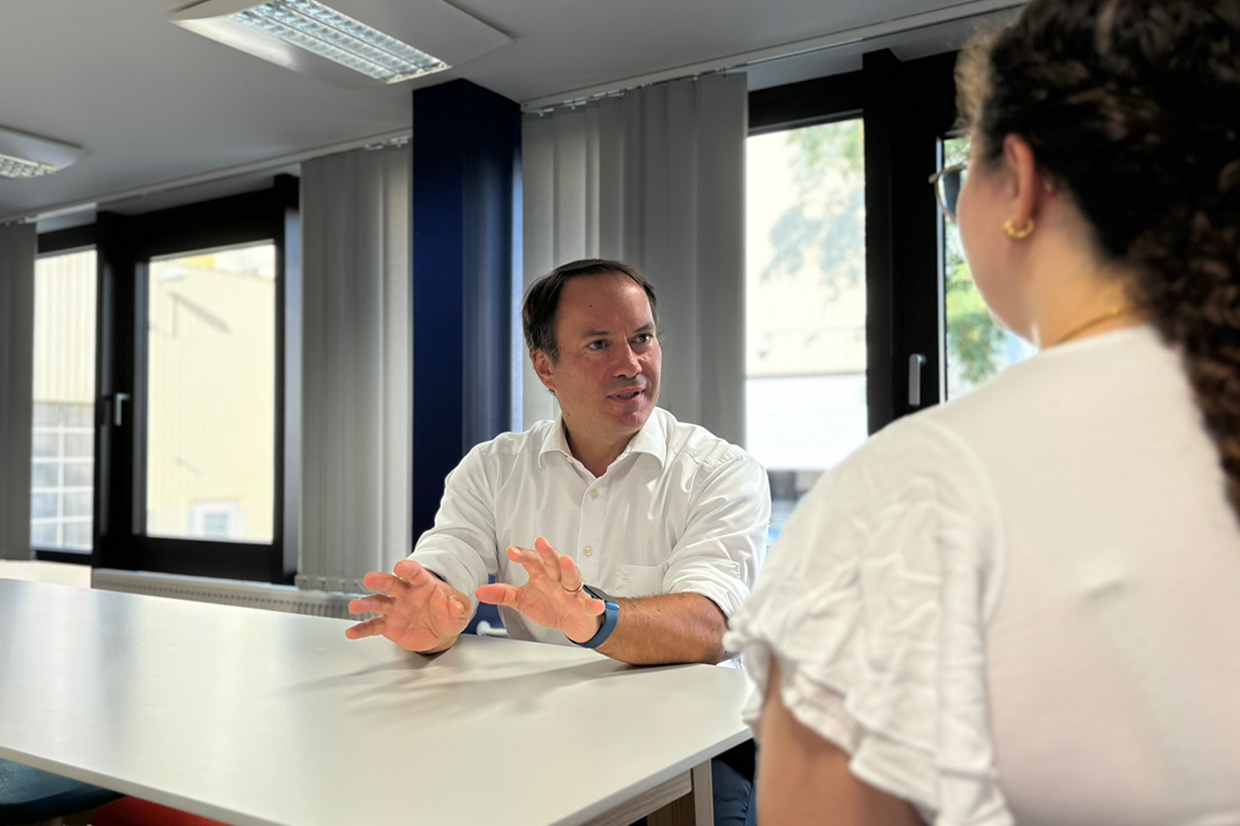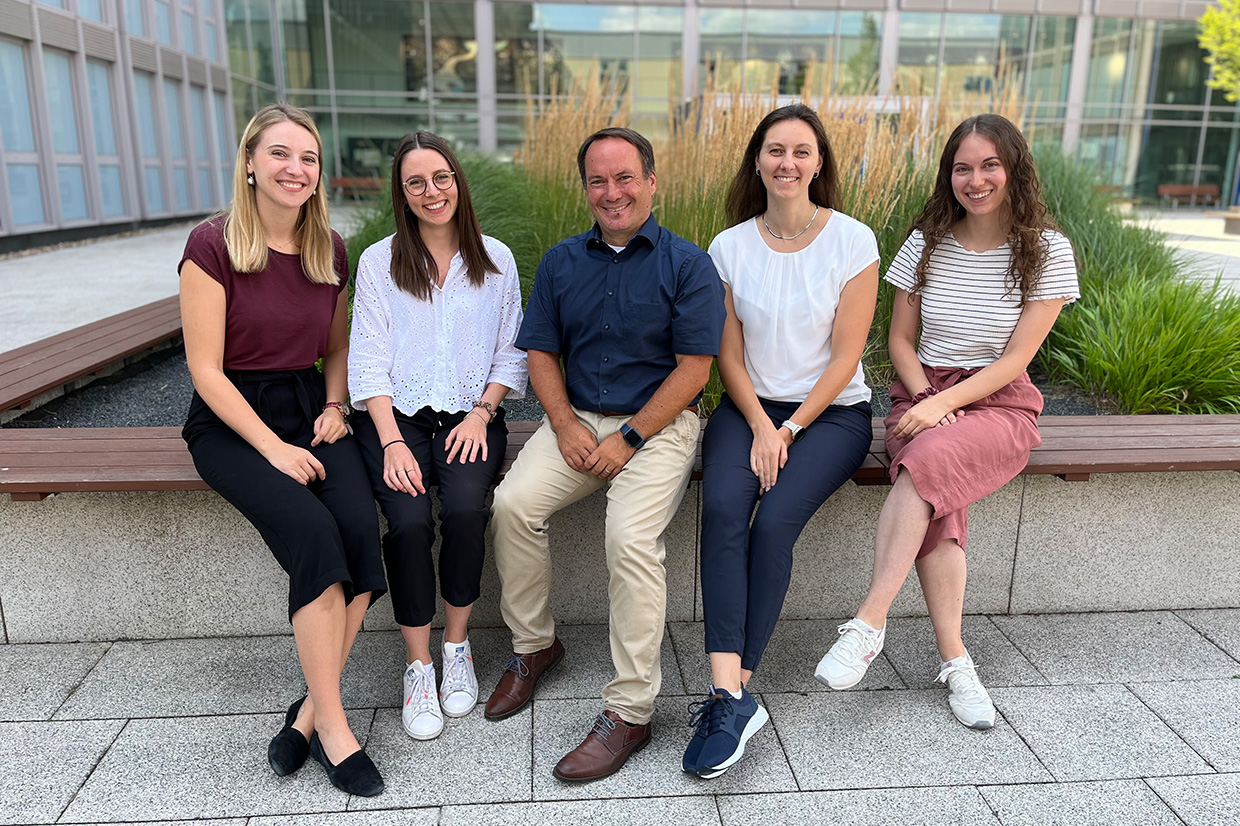

How can Krones promote and sustain healthy working and so improve the wellbeing of its employees? That is the question engaging the Health Management team – and one that plays a critical role in the creation of a healthy work environment. In interview, Florian Hirsch, Head of Health Management, gives an insight into the many different initiatives aimed at improving health in the work environment through company-wide schemes.

We in Health Management advise and support Krones AG in every aspect relating to healthy working and social sustainability – and by doing so, we help to create a safe and healthy work environment. To achieve this, we run surveys, programmes, campaigns, initiatives and measures aimed at improving the health of the workforce and the feeling of togetherness. To give you some examples, there’s the mental health campaign that we run, the “Start & Stay Healthy” apprentice programme and other events that are held in the individual plants. Our emphasis is on offering demand-driven projects for particularly impacted target groups. These cover issues such as mental health, ergonomics in production and healthy practice for shift workers.
Quite simply, those who are healthy are also at peace with themselves. As a company-wide health programme, we can improve the working atmosphere as well as the satisfaction, motivation and wellbeing of the employees. At the same time, we in Health Management also make a positive contribution to the productivity and efficiency of our workforce. Given the shortage of skilled workers and the growth we want to achieve, this is exactly what we need in order to be successful. While on the subject, I'd also like to return to the aspect of social sustainability, which is something particularly close to my heart. Our target picture, “Solutions beyond tomorrow”, is also about health, satisfaction and human interaction – so we at Health Management have an active part to play. The coronavirus pandemic made us all aware of just how little influence we sometimes have over absences and illnesses. We can achieve a lot through good, long-term interaction and a properly functioning team, though. The events and campaigns organised by Health Management give employees an opportunity to engage with each other and share common experiences outside working hours as well. This strengthens the feeling of togetherness and raises the satisfaction levels of employees.
But health is also an important factor for day-to-day operations. Long-term measures aimed at improving wellbeing reduce the rate of absence of employees for health reasons. This has the benefit that the productivity of Krones increases, while the burden on staff who have to cover for ill colleagues falls at the same time. And, of course, it is well known that healthy employees who feel well work better together, which means fewer conflicts, so that overall staff satisfaction rises. So you see, properly functioning health management offers benefits for everyone!
Physical and mental health can certainly be influenced by short-term measures, but a long-term strategy is essential if really sustainable positive effects are to be achieved. This is something we are constantly refining, because we want to ensure a lasting impact on workforce health. Our strategy is closely aligned to the needs and requirements of our industry. We are getting advice about the measures from MOOVE GmbH. These external stimuli help us to ensure that our services comply with and even exceed industry standards.
I’m convinced, therefore, that it is absolutely essential to have strategies for promoting the health and wellbeing of employees, safeguarding long-term performance capability and satisfaction, and ensuring that people enjoy working at Krones.

One of the most important measures is the assessment of mental stress and strain hazards that we at Krones carry out at all German plants. From the results of the surveys and other assessments we derive specific doings for supporting the departments appropriately in the challenges they face.
Alongside the mental stresses, Health Management’s responsibilities also include making ergonomic adjustments for work in production and in the office. To offer an all-encompassing package, we have the “Fit in the shift” programme, for instance, as well as initiatives promoting mental health or managing stress for employees in office and production environments.
In accordance with what is known as the SQM method (see box for more – editor), all our projects are run in three phases We make sure, for instance, that the campaigns are enjoyable while at the same time easy to integrate into everyday working life. In addition, we support general programmes such as higher education courses, physiotherapy directly in the plants and special services for apprentices, but we also participate in regional leisure activities such as the city cycling competition, the Arber cycle marathon and the district run.
The SQM method is based on the latest findings from behavioural research and helps in the training of employees on health matters. It consists of three phases:
Sensitisation: Explain to employees how certain relationships and patterns of behaviour influence their health
Qualification: Increase the knowledge and skills of employees through projects and practical tips
Motivation: Encourage employees to implement what they have learnt in their everyday working life
I believe we all need to take a closer look at three areas. When we think about “health”, we usually have physical health in mind. Of course this is particularly important, because it protects us from injury and physical complaints. And that in turn is essential, particularly in the case of production activities. But there are also things we need to remember if we work in an office. That’s why we offer a wide range of services, from improving ergonomics in everyday production to the “active break” for employees working at desks.
Mental wellbeing, on the other hand, is often bottom of the list – wrongly! It’s at least as important as physical health, after all: It is essential to promote good mental health because that helps prevent stress and burnout – and of course improves general wellbeing. Unfortunately, all too often this is something of a taboo issue – which is why Krones as an employer is very keen to break the taboo and raise awareness of the issue among the workforce. It’s also why Health Management got together with the Robert Enke Foundation just this year to run the “Impression Depression” campaign, for instance.
The third aspect is social health. This is where integration, friendship, social activities and societal factors such as economic stability are key factors that contribute to the wellbeing of people. Krones can make a contribution here too: Our programmes bring employees together, which in turn generates new contacts and perhaps even friendships in the work environment.
I believe it will become clear that all three aspects – physical, mental and social health – are critical for the performance capability and satisfaction of our workers.
Our programmes always start with a kick-off event at which the specific needs of workers and managers are clarified so they can be subsequently incorporated into the measures. The measures themselves run over longer periods of time of three to ten months, and we attach great importance to a culture of open communication. So we keep in touch with the participants at all times to find out at first hand where the pinch points are. We’re also particularly proud of our individual coaching sessions. These are integrated into every programme that we offer and take the form of workshops or face-to-face discussions. This is where individual challenges are addressed and possible solutions are formulated.
In addition, we run absence analyses, conduct mental hazard assessments and hold direct conversations with the employees. These supply us with valuable information. To give an example, the employee survey on the hazard assessment of mental stress in the work environment, which has already been conducted in the Flensburg and Rosenheim plants and will soon follow in Neutraubling as well, gives us direct feedback and enables us to address the specific issues raised. We’re also drawing on the empirical findings of our cooperation partner, MOOVE, which has already been active in this field right across Germany for more than fifteen years.
Absolutely! We don’t, after all, want health in the work environment to be an issue of whether or not an employee can afford it. The programmes and campaigns are financed by Krones AG, sometimes also in partnership with the Krones Occupational Health Insurance Scheme (BKK). The only exception is the physio service, for which employees have to make the usual top-up payments.
I really want to emphasise the point that health is firmly anchored in our corporate culture at Krones and something that we also actively promote through Health Management’s programmes. It is particularly pleasing to see increasing levels of participation in our programmes. To enable us to reach as many employees as possible, we will also be integrating demand-driven services into shift patterns in production departments, for instance, so that everyone can get involved.
On the subject of getting involved, it goes without saying that we need to be proactive in approaching employees and informing them of the many different opportunities. Managers can be important multipliers for us in this regard. Many have already recognised that the programmes offer benefits for their teams, so they are happy to set aside working time in order to offer support to their staff through the projects. Managers are continually made aware of the issues through hazard assessments and our advisory services, enabling them to keep an eye both on their own workload and on that of their staff and thereby prevent stress. At the same time, we provide support in finding solutions and explain when and why a particular option makes sense.
All of our activities are aimed at ensuring that the workforce gets comprehensive support. We do this by giving them preventative tools that will help to promote their health. We want to improve not only their working conditions but also their social interactions and thereby increase the long-term retention of employees in the company. What we are most pleased about is that the positive feedback we have received from the participants confirms we are on the right path.